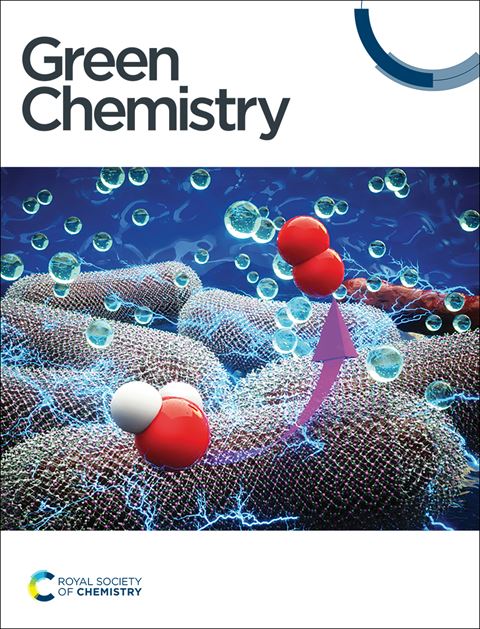Polyvinyl alcohol solvent-free adhesives for biomass bonding via rapid water activation and heat treatment†
IF 9.3
1区 化学
Q1 CHEMISTRY, MULTIDISCIPLINARY
引用次数: 0
Abstract
Bio-based adhesives have attracted significant attention from both academia and industry owing to their environmental friendliness and sustainability. However, conventional bio-based adhesives are predominantly solvent based, leading to major challenges, such as high viscosity and low solid content. In this context, this study presents the preparation of high-performance polyvinyl alcohol (PVA) solvent-free adhesives (PSFAs). These adhesives are prepared through a straightforward solution-casting method and exhibit substantial scalability, demonstrated herein by the production of a 1.1 m long sample. Following a rapid water activation (∼3 s), PSFAs show excellent adhesion capability, exhibiting excellent adhesive bonding performance with wood. Heat treatment initiates the formation of dual cross-linking networks between PVA chains, encompassing both chemical covalent bonds and physical hydrogen bonds, which leads to strong cohesion with the material. The wet strength of PSFAs reaches 2.25 MPa, exceeding that of the GB/T 9846-2015 standard (0.70 MPa) by more than two-fold. Moreover, PSFAs demonstrate exceptional durability and universality, enabling the preparation of diverse high-performance biomass composite materials. Compared to commercial adhesives, PSFAs are shown to be competitive across various dimensions, including adhesive preparation, wet bonding performance, cost-effectiveness, transportation, and storage time. In addition, the entire process of PSFAs only employs materials and chemicals recognized as safe in food by the US Food and Drug Administration (FDA). This study introduces a novel and promising approach for the development and application of environmentally friendly bio-based adhesives.

聚乙烯醇无溶剂粘合剂,用于生物质通过快速水活化和热处理粘接†
生物基胶粘剂因其环境友好性和可持续性而受到学术界和工业界的广泛关注。然而,传统的生物基粘合剂主要是溶剂型的,这导致了高粘度和低固体含量等重大挑战。在此背景下,本研究介绍了高性能聚乙烯醇(PVA)无溶剂粘合剂(PSFAs)的制备。这些粘合剂是通过直接的溶液铸造方法制备的,并表现出可观的可扩展性,本文通过生产1.1米长的样品来证明。在快速水活化(~ 3 s)后,psfa表现出优异的粘附能力,与木材表现出优异的粘合性能。热处理引发PVA链之间形成双交联网络,包括化学共价键和物理氢键,从而导致与材料的强内聚力。psfa湿强度达到2.25 MPa,超过GB/T 9846-2015标准(0.70 MPa) 2倍以上。此外,psfa具有优异的耐久性和通用性,可以制备各种高性能生物质复合材料。与商业粘合剂相比,psfa在各个方面都具有竞争力,包括粘合剂制备、湿粘合性能、成本效益、运输和储存时间。此外,psfa的整个过程只使用美国食品和药物管理局(FDA)认可的食品安全材料和化学品。本研究为环境友好型生物基胶粘剂的开发和应用提供了一条新的、有前途的途径。
本文章由计算机程序翻译,如有差异,请以英文原文为准。
求助全文
约1分钟内获得全文
求助全文
来源期刊

Green Chemistry
化学-化学综合
CiteScore
16.10
自引率
7.10%
发文量
677
审稿时长
1.4 months
期刊介绍:
Green Chemistry is a journal that provides a unique forum for the publication of innovative research on the development of alternative green and sustainable technologies. The scope of Green Chemistry is based on the definition proposed by Anastas and Warner (Green Chemistry: Theory and Practice, P T Anastas and J C Warner, Oxford University Press, Oxford, 1998), which defines green chemistry as the utilisation of a set of principles that reduces or eliminates the use or generation of hazardous substances in the design, manufacture and application of chemical products. Green Chemistry aims to reduce the environmental impact of the chemical enterprise by developing a technology base that is inherently non-toxic to living things and the environment. The journal welcomes submissions on all aspects of research relating to this endeavor and publishes original and significant cutting-edge research that is likely to be of wide general appeal. For a work to be published, it must present a significant advance in green chemistry, including a comparison with existing methods and a demonstration of advantages over those methods.
 求助内容:
求助内容: 应助结果提醒方式:
应助结果提醒方式:


